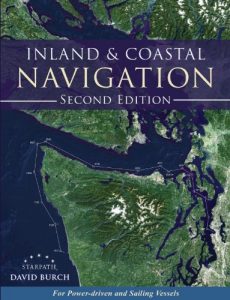A thorough, easy-to-read treatment of both traditional and modern small-craft navigation
This book is an updated and expanded edition of a text that has been used in navigation courses for 30 years. It covers practical small-craft navigation (sail, power, or paddle), starting from the basics and ending with all that is needed to navigate safely and efficiently on inland and coastal waters in all weather conditions. It is for beginners, starting from scratch, or for more seasoned mariners who wish to expand their skills.
Topics include:
Charts, Chart Reading, and Chart Plotting
Instruments and Logbook Procedures
Compass Use
Piloting and Dead Reckoning
Lights and Buoyage
Tides and Currents
Rules of the Road
GPS and other Electronic Aids
The GPS tells us where we are and how fast we are moving in what direction, but it can never tell us the safest, most efficient route to our destination. That fundamental task requires the basic navigation skills taught in this book, which we can use as well to check the GPS underway, and then be prepared to navigate without the GPS if we need to. The hallmark of good seamanship is to look ahead and be prepared..
The text covers not only the long tested traditional methods of navigation but also the efficient use of the latest technology in electronic navigation and charting, including the recent NOAA announcement that they are switching to all print-on-demand chart distribution.
This book is an updated and expanded edition of a text that has been used in navigation courses for 30 years. It covers practical small-craft navigation (sail, power, or paddle), starting from the basics and ending with all that is needed to navigate safely and efficiently on inland and coastal waters in all weather conditions. It is for beginners, starting from scratch, or for more seasoned mariners who wish to expand their skills.
Topics include:
Charts, Chart Reading, and Chart Plotting
Instruments and Logbook Procedures
Compass Use
Piloting and Dead Reckoning
Lights and Buoyage
Tides and Currents
Rules of the Road
GPS and other Electronic Aids
The GPS tells us where we are and how fast we are moving in what direction, but it can never tell us the safest, most efficient route to our destination. That fundamental task requires the basic navigation skills taught in this book, which we can use as well to check the GPS underway, and then be prepared to navigate without the GPS if we need to. The hallmark of good seamanship is to look ahead and be prepared..
The text covers not only the long tested traditional methods of navigation but also the efficient use of the latest technology in electronic navigation and charting, including the recent NOAA announcement that they are switching to all print-on-demand chart distribution.






